One of the hottest stars, artist Pongo is set to rapture WOMADelaide attendees with her electrifying show
One of the hottest tickets on the international circuit, Pongo comes to WOMADelaide to share the story of her life, her childhood, and how adversity has made her ‘unbeatable’.
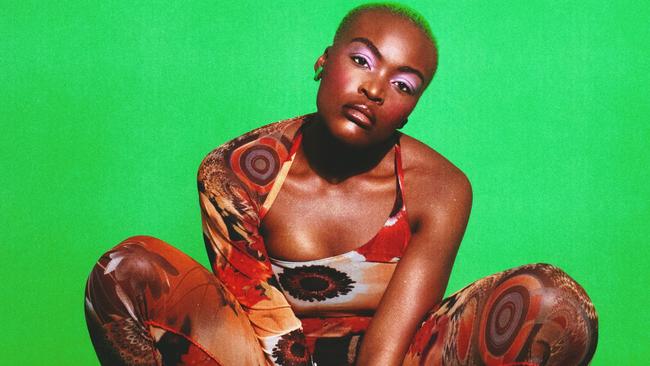
SA Weekend
Don't miss out on the headlines from SA Weekend. Followed categories will be added to My News.
The singer now known as Pongo fled war-torn Angola in southwestern Africa for Lisbon, Portugal as a girl, armed with a backpack of clothes and dreams of becoming a performer. Today, aged 31, after a couple of false starts, she is one of the hottest stars on the international festival circuit, a shaven-headed karate-kicking dynamo in hot pants whose high-octane shows guarantee crowds the time of their lives.
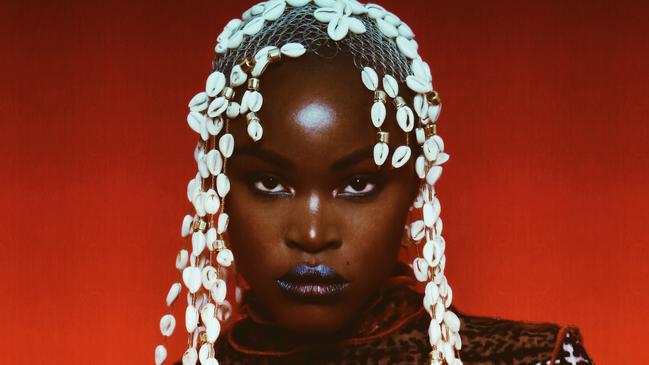
“Dance, dance, dance” she trill-sings in a mix of Portuguese and Kimbundu, her first language, flanked by a drummer, a DJ and a female dancer wearing shorts as short as her own. It’s summer festival season in Britain and Pongo is on a roll, having wowed an open-air stage at the Glastonbury Festival prior to this packed, jumping gig in a tent at WOMAD, the UK sister festival to WOMADelaide – which Pongo plays next weekend.
The song is her 2018 hit Tambulaya, which tells of a dance floor flirtation taking place during – and despite – Angola’s vicious civil war, a decades-long conflict that flared again in the late ’90s. Her birdlike voice soars over her own brand of kuduro music: booming basslines, pulsing synthetic beats and styles including hip-hop, Afrofunk and the giddy-up rhythms of Portuguese-speaking Africa.
“A lot of the expression in my work comes from my childhood memories,” says the woman born Engracia Domingos da Silva, the second eldest of five daughters to an ex-street dancer turned construction worker father and a mother who worked as a domestic helper.
“The many problems I have faced have made me stronger. I have fought hard for my freedom, for my rights as a black woman, as a woman and a human, and I am winning.”
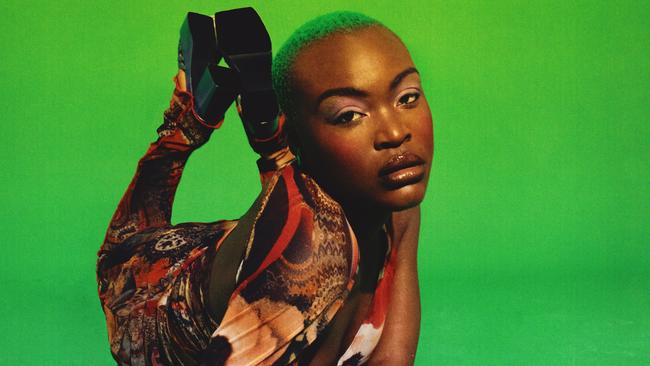
The video accompanying Tambulaya sees Pongo dressed in military fatigues and a beret, delivering her message, “Lift the skirt, break the rules, let loose”, through a megaphone, inviting all to move, release and heal. The same joyful, personal-is-political vibe informs her 2023 debut album Sakidila (Thank you), which includes the banger Bruxos (Sorcerers), a song with a compulsive “digui, digui, digui” refrain – try singing that high pitched and super fast – and lyrics that tell of the importance of keeping negative energy at bay.
In 2021 Pongo performed Bruxos on hip Berlin-based music platform ColorsxStudios, singing into a microphone in a minimalist purple room, galloping gleefully on the spot to the chorus. The video’s 70k-plus YouTube hits got her on the playlist of Spotify’s EQUAL Global, an initiative aimed at increasing the representation and visibility of female musicians around the world. An image of Pongo – bedecked in a magnificent cowrie-shell headdress – duly featured on a gigantic digital billboard in New York’s Times Square.
“Look where I am now” she sings on Baia, an electro belter that tells of overcoming personal difficulties and moving on. (Pongo tells me of the vicious racism she encountered as a young teen in suburban Lisbon, of an ultra-strict father who took out his frustrations on his family, of breaking her leg aged 12 after leaping from their seventh-storey apartment window.)
“Baia is an expression we use in Angola to get people’s attention.” She smiles, squares her shoulders. “I’m saying, ‘Hey! Check me out! I’m unbeatable!’ It’s a song for all the strong women in the world.”
Pongo originally found fame in Portugal in 2008, aged just 15, as lead rapper on the massive Portuguese hit Kalemba (Wegue Wegue), or Storm (Victory) by Buraka Som Sistema, a star electro-kuduro collective signed to BMG Records. They had heard a recording of her singing with Demon Squad, a group that regularly performed on a suburban Lisbon train station platform. Pongo would see Demon Squad on the way to her physiotherapy sessions, then started seeking them out.
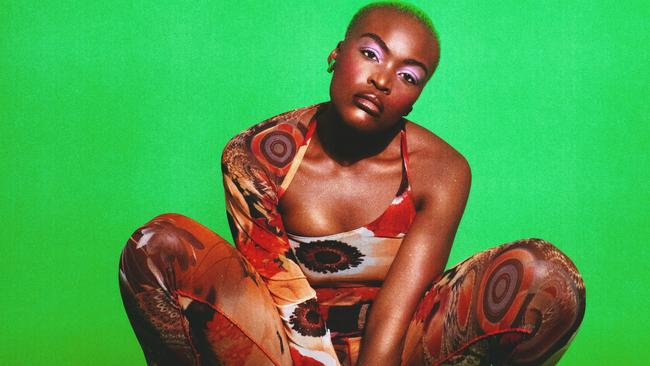
“I was always watching, so shy, dreaming of taking part,” she says. “One day they called on me to show them a dance move. I had many problems with my dad but he did teach me how to dance. After they invited me to join I’d tell my parents that I was doing homework at a friend’s place. I started singing, rapping, and writing songs.
“I was already performing Wegue Wegue with Demon Squad. It has lyrics about my dad’s dancing competitions and the street I grew up on, about baobab trees and semba music.” She references the off-the-beat Angolan genre, an early form of the kizomba and kuduro. (Semba means “touch of the belly buttons” – one of its characteristic moves.)
“I left school to tour with Buraka Som Sistema,” Pongo says. “I had to learn fast.”
The song received more than 11 million views on YouTube, and features on soundtracks for video games, including Need for Speed: Shift and FIFA 10. But the teenager received no royalties whatsoever.
“I was naive,” she admits. “By this point my father had gone back to Angola, and I felt responsible for my family. After two years I left the group. I was so disillusioned with the music industry. I thought I wanted to be a teacher; I even set up a little school for my sisters at home. But I wasn’t sure how to go about it.”
Years of menial jobs followed. Pongo worked as a house cleaner, listening to the radio play music by the likes of Avril Lavigne, Destiny’s Child and Rihanna, all early influences. “Rihanna also overcame a troubled childhood,” she says.
One day, while washing the floor, she heard the familiar strains of Kalemba (Wegue Wegue).
“I just froze,” she says. “This was my voice, my words, my song. I felt a wave of emotion, and just decided there and then I was going to re-enter the music business on my terms.”
Pongo’s reinvention was perfectly timed. The kuduro music scene in Lisbon was being transformed by technological advances, and an influx of sounds from postcolonial Angola, Guinea, Cape Verde and Mozambique. Pongo began performing and drip-feeding releases in ways that marked her out as an artist taking kuduro in exciting new directions.
In 2019 she played a festival at the Elysee Palace in Paris, before French President Emmanuel Macron and his wife Brigitte. “She told me that she dances to kuduro, and I felt equality in this moment,” Pongo says.
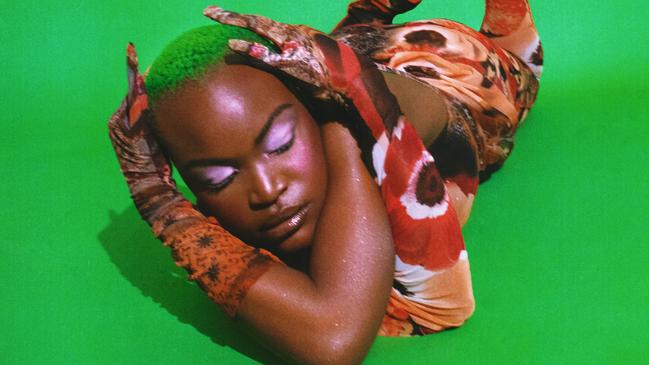
In 2020 Pongo released Uwa (Step), a five-track EP that broadened her fanbase, consolidated her themes. Sakidila, her debut album, reinforced her global reputation.
But the best way to understand Pongo is probably to see her play live. To witness her flamboyant array of outfits, hair colours and nail designs.
She brings the same energy to a small venue as she does to an arena, high kicking and twerking alongside her dancers before plunging off stage into the crowd, encouraging people to dance around her, to connect in a way that resembles the dança de roda (circle dance) particular to semba music, which Pongo danced as a kid.
“Tell Australia that if they want to come to see me, then they have to get involved,” she says.
“I will be bringing beautiful things from Africa. Beautiful people, style, energy, positivity and freedom. I want to share everything.”
Another smile. “I want to bring people together.”
Pongo plays Friday, March 8 and Monday, March 11 and does a Taste the World cooking and story session on Saturday, March 9. womadelaide.com.au




